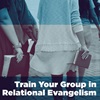Why do individuals leave the institutional church to join smaller house churches? What brings them to seek the face-to-face community of a Koinos church? Usually they do so in a desire to experience closer fellowship with other believers. Some have left the large megachurch or the urban downtown church; others have left the average neighborhood church. But one of the main reasons they leave is because they are looking for greater spiritual intimacy with others.
The following seven characteristics of a house church describe some of the spiritual dynamics that make a house church appealing to disenfranchised church members, or to those who have never been in a church. This is not to say that all house churches meet these descriptions. On the contrary, there are many streams of the house-church movement—some charismatic, some focused on home school and home birth, some following a specific teacher, and some simply adrift doctrinally and spiritually. However, when we describe house churches, we are describing what we see as a biblically faithful model of such.
1. House Churches Are Communities of Convictions
When people become a part of a Christian community, they usually affirm their faith through an "interacted identity" with the faith-experience of the house-church community. They learn what the others in the group believe and experience the values and attitudes of others. But most important, they open themselves to life-changing situations that others have experienced. They become "one" with the house-church community—often at a greater level than that which occurs in larger facility-based churches.
Most house churches are not held together by written principles, and most do not have detailed standards of conduct or ask new members to sign a covenant or pledge. Rather, people typically become members of the community as they interact with the values and attitudes of other believers in the church. Hence, everyone in a house church grows into a deep commitment to the values and experiences of one another.
In this sense, house churches become communities of conviction. They have a shared sense of how to live for God as they learn it from others. In a broader sense, this community of conviction is what makes a house church attractive to new members.
2. House Churches Are Learning Communities
Those who join a house church find a sense of family or oneness with other people and feel that they're a part of a faith-based community. They may even describe it as a "Christ-centered community."
The very nature of community is a shared experience of oneness by its members. Community is realized when all Christians share and then reciprocate by blessing and being blessed by others. Given the isolated nature of most individuals, those joining a house church open their lives to those in the community as others in the church relationally open up to them.
Oneness, community, is possible because each person has had the same profound experience in that he or she has met Jesus Christ, has become born-again, and understands what is involved in that experience. Because they understand each other's inner life (those experiences they can't necessarily verbalize), they are able to interact with one another and learn from one another.
3. House Churches Are Faith-Formation Communities
Often, American Christians think they must learn faith in a classroom where a teacher communicates or explains a doctrinal statement. They may even imagine a schoolroom practice of students studying such a statement and committing it to memory. However, this educational process does not usually make that doctrine part of their lives.
The New Testament uses faith as both a noun and a verb. When faith is used as a noun, it is a reference to a doctrinal statement of faith—a concept to internalize. When faith is used as a verb, it suggests action, such as trusting in God, obeying his Word, and so forth.
Most house churches do not ask members to sign a doctrinal statement of faith, nor do they usually teach their beliefs in structured classes. Correct doctrinal faith (the noun) is acquired as a member exercises inner faith (the verb). These occur as facets of a person's overall response to God.
Both living faith and doctrinal faith are important and necessary. However, which comes first? In house-church contexts, living faith that is nurtured in a community comes first.
Usually, a person's faith is formed through reading the Scriptures: "Then faith [comes] by hearing, and hearing by the word of God" (Romans 10:17, NKJV). But a person also gains faith through interacting with God.
When the formation of faith occurs in community, new believers observe older believers following Jesus Christ and, in the same way, they follow Jesus Christ. Many young believers see the older believers step out in faith, and they follow the same example. Thus, their faith is both formed and nurtured in community under the influence of others. In community, young believers typically grow in their desire to serve God, and they begin to find places to serve him. Usually, they start with small tasks in a house church and then grow to greater areas of responsibility and accountability. Therefore, it is in community that young believers discover their spiritual gifts and calling.
4. House Churches Are Value-Formation Communities
As the community becomes important to a new believer, its values become contagious. New believers find themselves aligning with others in the group. If others in the group model honesty in their business dealings, the new believers begin to value honesty. The same happens with purity of heart, obedience to God, and service to other people.
Taken together, these values create a sense of self-identity: I am a follower of Jesus Christ. Over time, these values help people discover how they are growing: I am a fully committed follower of Jesus Christ.
5. House Churches Are Mentoring Agents
When new Christians enter a house church, they are not initially taught what to believe, nor are they taught how to practice the Christian life. These values and attitudes are assimilated through observation and non-verbal experiences, usually through one-on-one relationships. These mentoring relationships are need-driven rather than driven by the study of a prepared curriculum.
Because most house churches see themselves as a close-knit extended family, they often do not have formal statements of faith and practice—any more than we do with our biological families. New believers are accepted for who they are, but soon feel pressure (and hopefully desire) to assume the attitudes of others in the house church, to live the way others are living, and to prize the things the others value. As a result, it's usually not any one individual who leads them into acceptance in the house church; it is the community as a whole that becomes the mentoring agent.
6. House Churches Are "Belonging" Communities
The house church offers a network in which new Christians feel recognized for who they are, as well as for who they are becoming in Christ. Therefore, the house-church community becomes a powerful focus for influencing the lives of new believers.
In mentoring, the house-church community accomplishes two things: First, the house church, by its very nature of community, challenges new believers to enter into their shared experience. Second, the house-church community is supportive of its members no matter where they are in their spiritual pilgrimage of faith.
7. House Churches Give Self-Identity
Just because people give themselves to community doesn't mean they lose their self-identity or sense of belonging. They still have other loyalties outside the house church that may not be related to the values of the house church.
Although community begins with the "born-again experience," this doesn't mean that every person in a house church will always agree with other believers in every aspect of life. However, because regeneration influences the central things valued in life and the principles under which Christians live, everyone in a house church who has had a similar experience shares those values and attitudes.
Community encourages hospitality. Each member of a house church serves one another, respects one another, and, in a true sense of the Scriptures, loves one another. This means they accept each other as unique individuals within the community. As a result, there is freedom in community; at the same time, there is oneness in the community.
Because those in a house church experience community, they seldom indoctrinate people with a specific doctrinal statement. Most house churches do not have a written creed or confessional. They do not demand agreement in order to become a part of the community, nor do they attempt to force everyone in the community to accept all of the tenets of their doctrinal position. This is because they realize that community is a greater "glue" that bonds them together than the glue of a doctrinal statement. Therefore, the community recognizes and values each other's individuality and personhood.
From 11 Innovations in the Local Church, © 2007 by Elmer Towns, Ed Stetzer, and Warren Bird. Published by Regal Books, www.regalbooks.com. Used by permission. All rights reserved.









